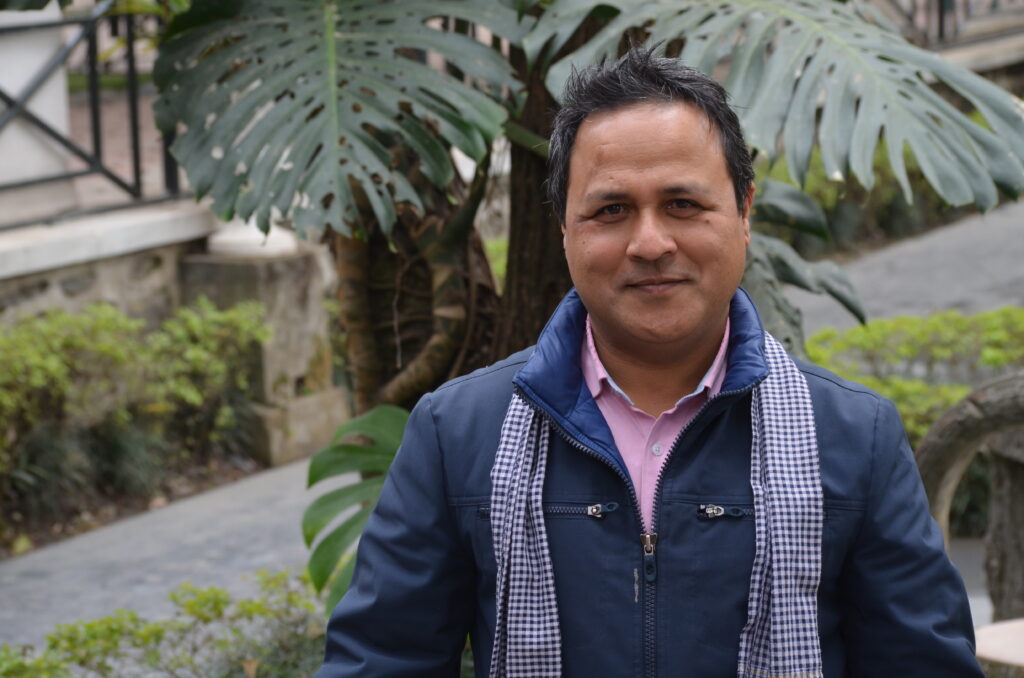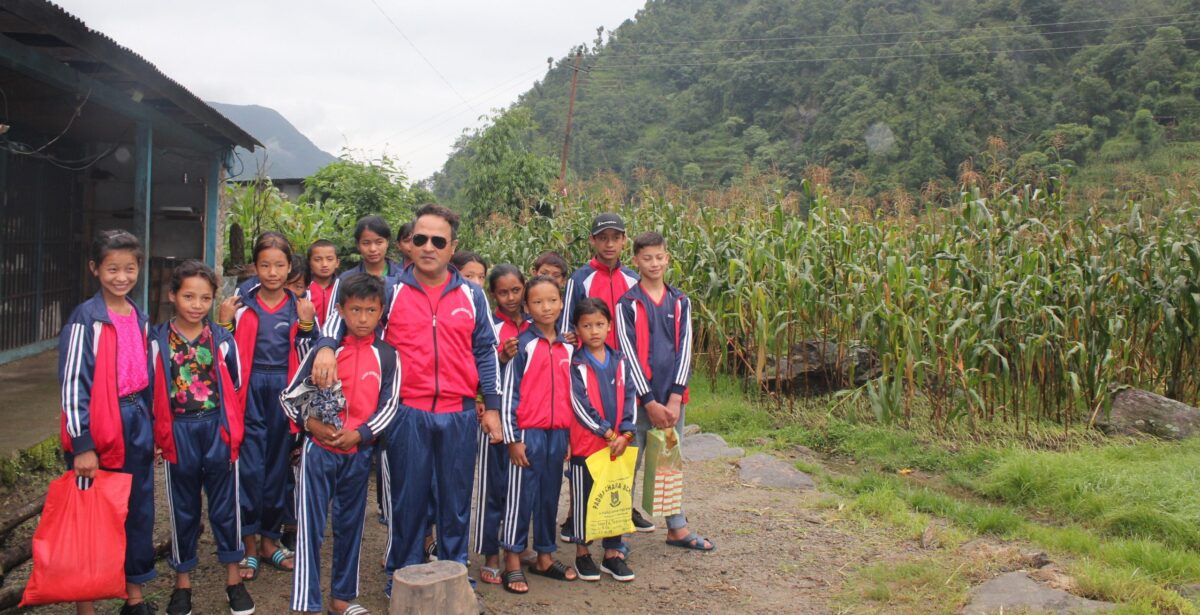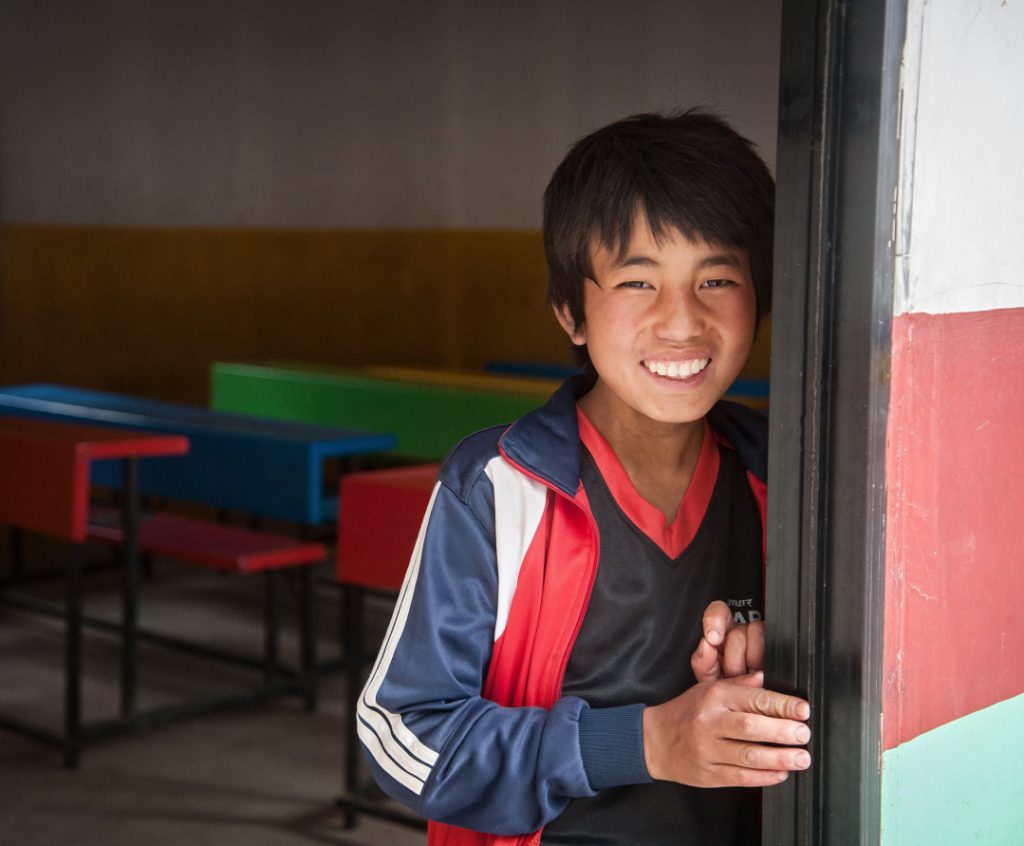Pralhad Dhakal was raised in a small community in Nepal. Life in his village presented many challenges: having to walk far to access education and witnessing the discrimination women – including his mother and sisters – faced. Today, Pralhad leads our Remote Community Development work, promoting health and education, and protecting women and girls.
Pralhad Dhakal is a giver at heart. Brought up in a small village where his father was a local county politician, Pralhad learnt the power of serving others very early in life.
“When I woke up in the morning, there were always two or three people at my doorstep to ask for help – all day, every day,” Pralhad reflects. “They were in some kind of some crisis or they needed support. I grew up always thinking about helping others and that has stayed with me. My father had a big impact on me. I’m responsible for the community. I’m responsible for helping others.”

Pralhad’s village was five hours or 75km from the capital, Kathmandu. It wasn’t until Pralhad was 11 years old that he saw a car for the first time as there had previously been no road to the village. What the village lacked in modern technology and infrastructure, it made up for in beauty. Looming mountains, vibrant emerald grass, fields swarming with cattle and water buffalo.
Of course, this beauty and isolation came with inevitable challenges. Pralhad’s daily commute to school was a three and half hour round walk, scaling large, imposing mountains. His school had no modern facilities – simply a room with a blackboard and a teacher. It was so basic that students lugged stones with them every morning to construct the school themselves.
“So, in a way the school and the students grew up together,” Pralhad laughs.
At home, Pralhad’s upbringing was atypical. He was raised in a complex polyandrous family – meaning his father had multiple wives.
“My father was married to four different women at the same time,” Pralhad says. “This situation of my mother and many other women in my village exposed me to discrimination against women and how they suffer. Women were discriminated against more than the cattle.”
These formative experiences lit a fire within Pralhad. He revolted against these repressive social structures and worked tirelessly to overturn imbedded forms of discrimination in rural Nepali life. Eventually, he channelled this rebellion into a career dedicated to erasing inequalities and improving opportunities for all.
After finishing school, Pralhad packed up his life and moved to Kathmandu to study Political Science and Economics. Without money or a support network, Pralhad spent his early years in Kathmandu surviving off passion to help people in need. His first job in Kathmandu was a temporary government position. He then worked for a variety of international development organisations for over two decades, including the Red Cross, Save the Children and Voluntary Service Overseas. He was known as an expert trainer and facilitator, particularly in the area of child protection. In 2007, he joined the Adara family as Nepal Country Director and hasn’t looked back.
“It was immediately evident to me that Adara wasn’t just an organisation that talks about ‘development.’ They actually deliver it. You can see the evidence that Adara contributes to actually changing the system through models of excellence,” Pralhad says. “I love that you can see the direct impact the work has on the life of the people.”
Sixteen years later, Pralhad has seen Adara’s work in Nepal grow exponentially. His role is widespread – managing a large team, as well as our partner organisations. But Pralhad says his favourite part is spending time with the people Adara supports.
“I spend most of my time with the people of the communities we work with. I love being on the ground and really at the centre of the work,” he says.
“To create real, meaningful change I believe you have to understand the people whose lives you are directly impacting. I love to get to know them, understanding the real issues from them and working with the people to deliver the services they need.”
In all his years working with Adara, there is one day Pralhad will always remember. It was 25 April 2015, the day a devastating earthquake hit Nepal, killing over 9,000 people. Pralhad recalls this tragedy as one of the most testing times in his career. The earthquake left communities destroyed. Entire livelihoods were shattered.
“It was a devastating earthquake. Thankfully none of our children or youth were injured or killed,” Pralhad says. “Once we knew they were safe, Adara decided to not only protect our youth but go beyond that. We thought, ‘now we are safe, let’s go and help others.”
Pralhad’s leadership during this crisis was inspirational. Following the earthquake, he led a team that reached more than 10,000 people in need with medical support, food, shelter and other essential services. As the crisis subsided, we began to plan a longer-term project to support the Ghyangfedi community where more than 80 people were killed and every building was either damaged or destroyed. We embarked on a project to create a significant new school to provide a quality education for children and help this community rise from the tragedy of the earthquake.
“Ghyangfedi is known for being dangerous for girls – it has high rates of child trafficking,” says Pralhad. “We keep girls in school where they are safe, and they are empowered and enabled to change their lives through education.”
Today, the school is the pride and hope of the community. Where once there were very few girls in the community over the age of 12 due to trafficking, there are now countless young women finishing their education and daring to dream big.
Looking forward, Pralhad is excited to see our work continue to grow.
“I look forward to sharing our 25 years of experience and expertise, including our mistakes and successes, with the world to make a wider impact and touch more lives,” he says.
“Long term, I wish to take the work beyond Nepal and impact the development field by showing how to do remote development in an effective manner and change the lives of the people by changing the system.”
As we built out our AdaraRemote model of community development, Pralhad is poised to effect change at an even greater scale. And if you ask Pralhad, he insists he was always meant to do this kind of work.
“If I wasn’t working for Adara, I would still be helping people in some way. I think I would still be working with children, women and girls, and marginalised people of this country,” Pralhad says. “It’s in my nature to help people, it’s an instinct. Working with Adara, I am living my passion every day.”

